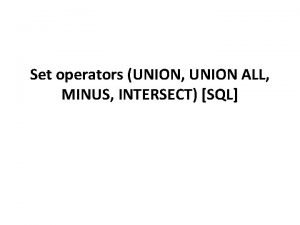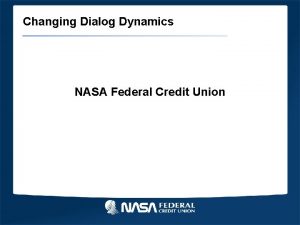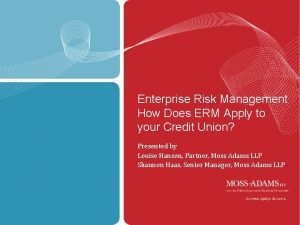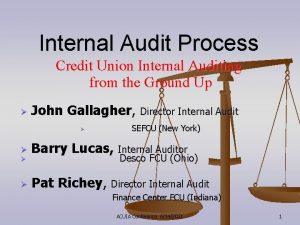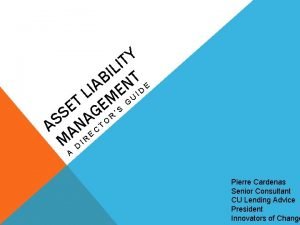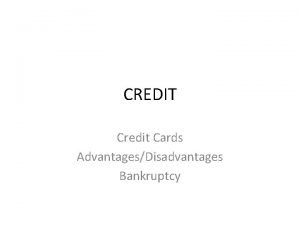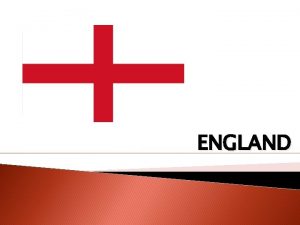Great New England Credit Union Show April 28














- Slides: 14

Great New England Credit Union Show April 28, 2016 Third-Party Vendor Management and Diligence Standards for Evaluating Service Providers A Practical Guide for Credit Unions in the Selection, Monitoring, Risk Management, Contracts and Exit Strategy to Protect Assets and Members while Meeting Regulatory Expectations Presented by Andrew Liput President & CEO Secure Insight #Res. Mort. DC

Regulatory Guidance • Original guidance: • OCC (2001); FNMA (2005), NCUA (2007) • Updated guidance • FHFA (2014); OCC (2013); NCUA (2013); FRB (2013); CFPB Bulletin (2012); FDIC (2008); FFIEC (2014/15) • Third-party risk management is among agency supervisory priorities • Agency leadership has stated various concerns • Regulators have taken a number of enforcement actions based on deficiencies in third-party risk management #Res. Mort. DC

NCUA Directives NCUA acknowledges that third-party relationships are • essential NCUA but acknowledges that third-party “… inadequately managed and controlled third-party relationships result in unanticipated relationships arecan essential but “… costs, legal disputes, and financial loss…” The agency does not inadequately managed controlled want to “stifle the innovative use ofand third-party relationships to meet member needs and third-party relationships canstrategic result in objectives, ” but wants to reemphasize that credit unions unanticipated costs, legal disputes, “clearly understand risks they are undertaking and balance and control loss…” those risks…” NCUA Guidance Letter and financial The agency does 07 -CU-13, December 2007, Reaffirmed 2013. not want to “stifle the innovative use of third-party relationships to meet member needs and strategic #Res. Mort. DC

Regulatory Expectations • Principles-based regime: Manage the risks presented by service providers and other thirdparty relationships • Must identify, measure, monitor and control the risks arising out of each third-party relationship • 4 Stages of Due Diligence: • • Risk Management Due Diligence Contracts Ongoing Monitoring • For each of these processes, the company must: • Assign clear roles and responsibilities • Conduct periodic independent reviews • Document the plan, process, and performance reviews #Res. Mort. DC

Risk Management Lifecycle PLANNING • Senior Management should outline the strategic purpose and assess the complexity of the proposed relationship. • Consider how the relationship will affect information security systems, determine if the benefits outweigh the risks, develop contingency plans, and develop a plan on how to select the vendor. DUE DILIGENCE & 3 RD PARTY SELECTION • The degree of the due diligence investigation should match the level of risk the relationship poses, for example, for ‘mission critical’ vendors, you should perform on-site visits. • Evaluate, among other items, the 3 rd party’s (i) ability to comply with applicable laws and regulations; (ii) financial condition and stability; (iii) reputation; and (iv) applicable P&Ps. CONTRACT NEGOTIATION • The contract governing the relationship should include, but not be limited to, provisions governing (i) the nature and scope of the arrangement; (ii) performance measures or benchmarks; (iii) responsibilities for providing, receiving, and retaining information; (iv) responsibility for compliance with laws and regulations; (v) clear cost and compensation arrangements; and (vi) default and termination provisions. ONGOING MONITORING • Senior Management should appoint staff that is knowledgeable about the subject matter and who has authority and accountability to regularly monitor each vendor. • The ongoing monitoring may include periodic reviews of the quality of the product and adherence to service-level agreements and performance metrics. TERMINATION • Termination may occur due to the expiration or satisfaction of the contract, desire to seek an alternate service provider, to discontinue the service, or as a result of a breach of contract. • Any termination should be handled as efficiently as possible, and should ensure that any and all borrower Non-Public Personal Information in the vendor’s possession is destroyed or returned. #Res. Mort. DC

Evaluating Risk & Contingency Planning Reputation Risk Operational Risk Compliance Risk 3 rd Party Risk Credit Risk Strategic Risk #Res. Mort. DC

Evaluating Risk Many successful vendor management programs utilize a three-tiered system. This system assigns each vendor to one of three tiers depending upon the risk associated with the service provided (i. e. access to NPPI, consumers, funds). Tier 1 • Vendors that provide a critical service to the company and are integral to its ongoing operations. • Vendors that have access to highly sensitive information, such as borrower Non-Public Personal Information, or have direct borrower contact. Tier 2 • Vendors that are frequently used and relied upon, but are not necessary for the continued functioning of the company. • Vendors that may have access to confidential or critical internal-use only data and have no direct contact with borrowers or customers. Tier 3 • Non-critical vendors which are easily replaced. • These vendors have no access to confidential or critical information and pose no risk to consumers. #Res. Mort. DC

Due Diligence • • • Ensure the vendor is currently in compliance with all regulations and can amend processes as needed to ensure flexibility and future compliance. Review regulatory exams and/or consent order(s), if applicable • Review audited financials for last two years Evaluate growth, earnings, and potential future litigation to understand the party’s overall financial stability • • Financial Condition Legal & Regulatory Qualification & Reputation Policies & Procedures Review resumes and backgrounds of management Evaluate depth of resources and industry reputation, including customer complaints or previous litigation #Res. Mort. DC • • Request copies of all P&P that will govern the services performed for your company If new regulations are pending, inquire as to how the vendor will update the P&P as needed, and request copy of project timeline

Contracts SCOPE The nature and scope of the arrangement should be clearly laid out, detailing the tasks to be performed by each party. If the vendor is performing multiple services, you may decide to structure the agreement as a Master Services Agreement (“MSA”) with separate Statements of Work (“SOW”) for each specific task being performed. RIGHT TO AUDIT Ensure the contract allows your company to closely monitor the performance of the vendor and perform audits, including those conducted on-site, at your discretion. CONFIDENTIALITY Any vendor with access to confidential or private information, including but not limited to borrower Non-Public Personal Information (“NPPI”) should be bound by strict confidentiality provisions. COMPLIANCE WITH LAWS The contract should require the vendor to comply with all applicable laws governing the services, specifically naming those that are most critical, including consumer protection laws such as RESPA, TILA, Fair Lending, and SAFE Act. DEFAULT & TERMINATION Clearly state what actions will constitute a default, whether any defaults are subject to cure provisions, and when a default will allow termination by one party. Sensitive data should be returned or destroyed when terminated. INDEMNIFICATION Ensure the vendor will indemnify the company for all costs incurred as a result of a breach or error by the vendor, or its employees and agents. Carefully review any limitations on liability clauses proposed by the vendor. #Res. Mort. DC

Ongoing Monitoring Ø It is essential to continue monitoring all aspects of performance for the duration of the relationship. Ø Tier 1 vendors should be monitored on a monthly basis. Ø Consider implementing the use of a scorecard to measure the vendor’s performance. Ø Conduct quality-control reviews of the vendor’s work product and request remediation for all adverse findings. Ø Employees with direct interaction with the vendor should escalate serious issues or concerns to Senior Management immediately. #Res. Mort. DC Ø If your company lacks sufficient internal resources or expertise, determine whether it is beneficial to utilize industry experts, such as specialty law firms or vendor risk consultants to assist with initial duediligence and contract negotiation. Ø Properly document all aspects of your vendor management program, from the Vendor Management Policy down to the results of due-diligence and QC reviews. Ø Closely monitor any and all customer complaints to ensure the root of the cause is not vendor performance. Ø Executive management or the Board of Directors should review the relationships on an annual basis.

Theory vs. Practice To be successful must be comprehensive Must monitor Not all lenders manage risk the same Regulators are vague on what constitutes full compliance #Res. Mort. DC Public resistance to providing personal data Monitoring requires technology and manpower ($$$) May create competitive disadvantage; Risk referral sources May have a great system and still be subject to penalties on an audit or occurrence

Useful Tools & Tips • Set up a separate vendor management office (outsource) or internal management position, depending on your resources • Ensure independence • Employ technology to help manage your vendors • Utilize your policies & procedures • Produce and analyze periodic reports • Beware of operational deficiencies • Exit relationships when they are no longer viable #Res. Mort. DC

Thank You Andrew Liput, President & CEO Secure Insight 100 Lanidex Plaza, Suite 1201, Parsippany, NJ 07054 Telephone: 1 -877 -758 -7878, Direct: 973 -542 -2221 Email: aliput@secureinsight. com #Res. Mort. DC

Andrew Liput is the President & CEO Responsible for overall management of business operations, program design, enhancements and client implementation plans, key business partner relationships, key business partner contracts and agreements, coordinate insurance partnerships, industry affiliations (MBA, ALTA, FNMA, CPFB, etc. ), Advisory Board, and strategic development at Secure Insight. Andrew Liput founded Secure Insight after seven years of exploring answers to weaknesses he perceived in the area of risk management in the mortgage industry. He has spent more than two decades as an attorney and as a loss mitigation specialist. He draws upon an extensive legal and business background while spreading the word about enhanced risk management to lenders around the Country. Andrew is known nationally as an authority on mortgage banking issues. He writes regularly on mortgage industry issues for The Mortgage Press and other publications. He has also been a featured speaker on mortgage fraud issues at national mortgage banking conferences. He has hosted a widely-read blog on the Internet covering financial industry issues. In addition to his writing and speaking, Andrew acts as a consultant to banks throughout the United States on issues such as repurchases, licensing, regulatory matters and loss mitigation arising from mortgage fraud. Andrew is an honors graduate of Drew University (1984) and Fordham Law School (1987). Andrew also did post-graduate work at NYU in New York City (1996) and the Wharton School, University of Pennsylvania. (1998), and Northwestern Theological (2011). He is admitted to practice as a lawyer in NY, NJ, CT, and NC. Andrew serves on the Board of Directors of the Center on the Holocaust, Diversity and Human Understanding in New York, and is a Board member of Bridge the Gap, a New Jersey based charity that feeds and clothes the homeless. He is a member of Who’s Who of American Lawyers, and the NJ and American Bar Associations. He has been honored by the Association for Corporate Growth and the Turnaround Management Association for his lead efforts to conduct an internal forensic investigation and manage the wind-down of US Mortgage Corp. , one of the largest Bankruptcy Cases in New Jersey caused by mortgage industry fraud and owner defalcation. Andrew is married with four children and lives in Mountain Lakes, NJ. #Res. Mort. DC
 Conservation
Conservation Union workhouses in victorian england
Union workhouses in victorian england Sql union minus intersect
Sql union minus intersect Nasa fcu
Nasa fcu Centric federal credit union
Centric federal credit union Building society vs credit union
Building society vs credit union Enterprise risk management for credit unions
Enterprise risk management for credit unions Hiway federal credit union calendar
Hiway federal credit union calendar Ukrainian national credit union association
Ukrainian national credit union association Credit union internal auditing services
Credit union internal auditing services Leixlip credit union
Leixlip credit union Alm policy credit union
Alm policy credit union Www.missionfcu.org
Www.missionfcu.org Netbranch rbfcu
Netbranch rbfcu Best financial credit union
Best financial credit union


